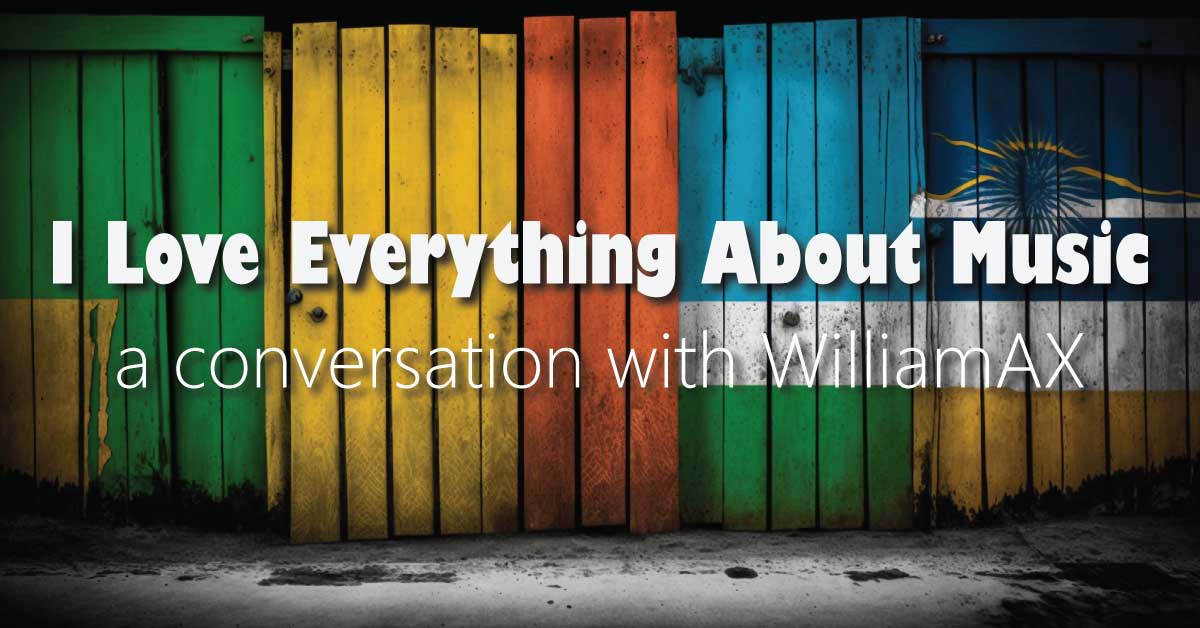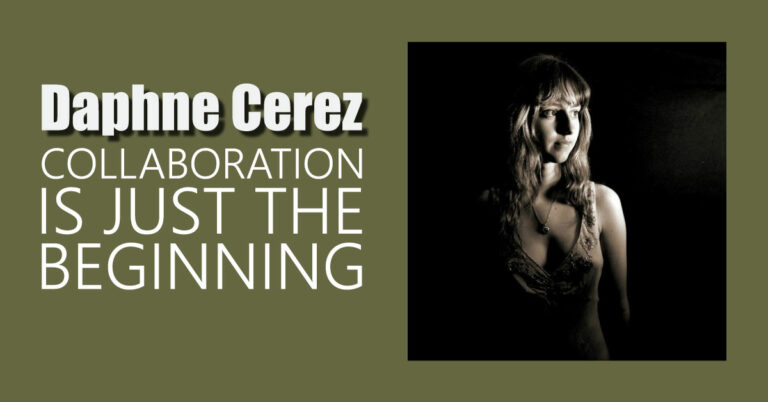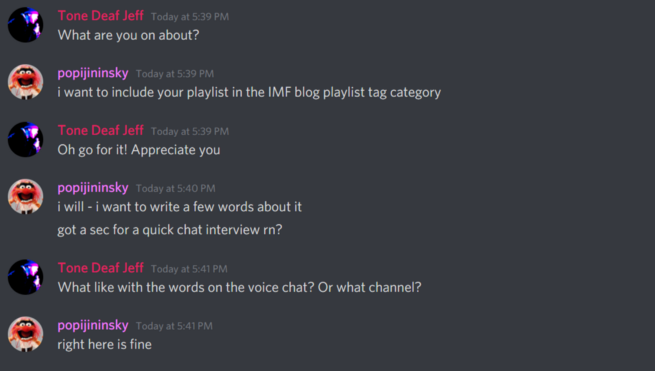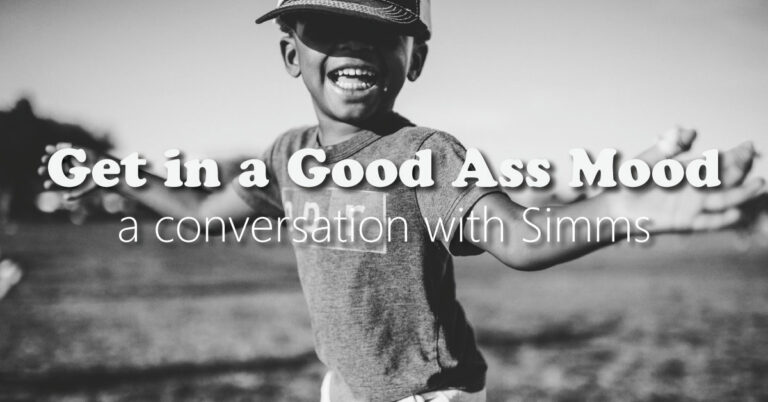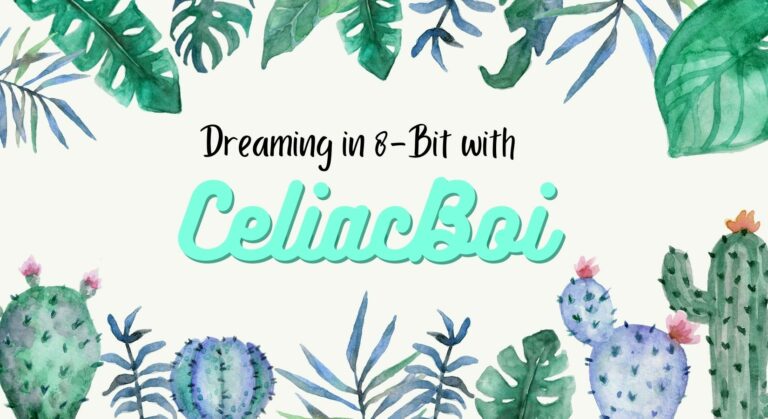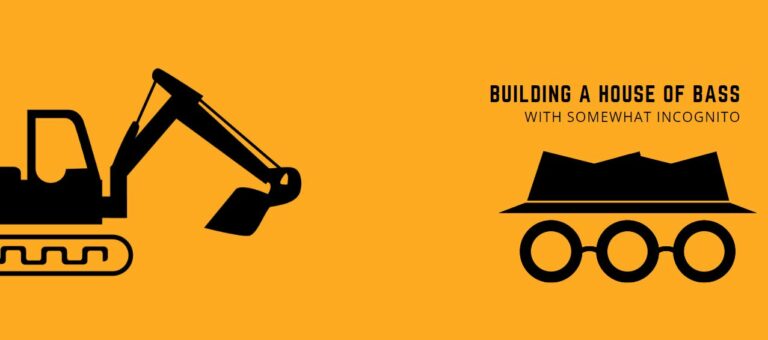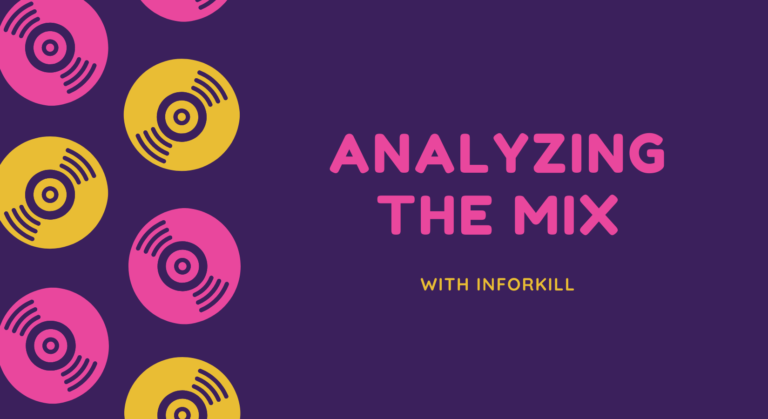This piece is part of my series called Why We Create, in which I talk with producers and musicians about their creative process. I started this project as a way of investigating my own creativity, and it’s really taken on a life of its own. In a really meta way, this project investigating creativity has become part of my own creative body of work, and it’s been cool to experience this unfolding over the last year and a half.
A while back, I started making spoken word pieces with each of my interview subjects, in which they respond to the prompt, “What do you think about when you think about making music?” These pieces are all collected on my Soundcloud and Bandcamp – check out some of the things others have said about their work.
Along with this interview I did with IMF producer WilliamAx, I made a track from his spoken words, set to a remix of [xxxx] from his upcoming album. Listen while you read for the full multimedia wraparound Why We Create experience.
Rumors of the demise of this series have been greatly exaggerated. They’re coming a bit more slowly these days, but I’ve got a list of several producers who will appear here over the upcoming months. Get excited – you won’t be disappointed.
WilliamAx is a musician, composer, lyricist, and producer. His sensibilities tend toward classic rock, sprinkled with a bit of Brazilian flavor. He’s had a long journey to self-produced music, and is finishing his debut album right now.
He is a regular host of IMF Live Community Review, making space for others to share and get live feedback on their music. He is an active collaborator with producers and musicians around the world, in IMF and otherwise.
I had the privilege of speaking with WilliamAx about his creative process recently. Our interview is below, edited for clarity and brevity.
please enjoy,
– popijininsky
How did you discover music?
I was lucky enough to be born into a musical family. My parents weren’t musicians, but a lot of my relatives were, and everyone in my family enjoyed music, so I was exposed to lots of very different styles of music as a kid. My dad loved Brazilian music and also classic rock. My brother introduced me to grunge, and alternative rock, and hip hop.
When I was young, I went on a three day road trip with my aunt, and we only had three albums with us: The Best of Adoniran Barbosa, Kiss Alive III, and The Best of the Doors. I ended the trip knowing all of the songs on all these albums by heart, and that really shaped the way I listen to music, even now.
I fell in love with the sound of the Hammond organ from that Doors record. When I was a young teenager, the internet was just starting to be a thing. I started exploring online for all my favorite artists and albums, and really deepened my knowledge. I also used to go to the record store all the time to get the latest music.
That was a really interesting time for music – there was a lot of really great new material being released, and a lot of the classic stuff I was listening to was still not really that old, and people were still finding inspiration in it.
Brazil has an extremely rich culture – not just musically. Samba and bossa nova from the 60s and 70s is some of the most challenging music to play on guitar, and that’s some of the stuff I learned to play early. I asked my guitar teacher to show me some of this more challenging stuff, and really had to push myself to learn it – enough to be reasonably good at it now.
I love Brazilian rock. I think we have some of the best bands in the world here. Many of them never got famous outside Brazil because they sung in Portuguese, but they are as good as any bands in the world. Os Mutantes was an example of one band that is known outside Brazil. I remember an interview with Kurt Cobain, where he said that he was really influenced by them. Brazilians have made their way into every possible musical genre – from metal to punk to R&B. That was a privilege to grow up with.
When I was 12, my dad gave me my first acoustic guitar, which started my actually playing music.
What did you want to do when you picked up the guitar?
I was listening to all these rock artists—John Frusciante, Hendrix, The Doors. We had just moved from Rio to the countryside. I was trapped in an apartment without much to do, and I thought, “I’m listening to all this, and I’m really absorbed by music. I would love to be able to play, and to express myself through music.”
When I first put my fingers on the strings, and started to learn to play riffs I knew, that was magical. I knew immediately that I would keep doing it. Electric guitar came a couple years later. Later, I picked up the bass, which I also really love.
When did you shift from wanting to play an instrument to wanting to create music?
When I was probably 15 or 16, I tried for the first time to write my own music. It’s funny—I find it much easier to write lyrics in English than in Portuguese. Maybe it’s because there are so many really beautiful songs in Portuguese, and I never really felt like I could write things that could compare. I always thought my lyrics were really cringey. But later, when I learned English, I tried to write English lyrics. I found it much easier, maybe because I don’t feel like I have the same responsibility to be skillful and poetic in English.
I’m just releasing my first album now – all these years later. Late September, I released my first track online. It took me that long to get over my self-consciousness. I only really started singing five or six years ago. I had the same feeling of wanting to express myself, and that motivated me to move forward, even though my confidence wasn’t what I wanted it to be.
It took you some time to start releasing music – what was that about?
It’s been an introspective journey, of me making peace with myself and my ability, and with my limitations.
About 10 years ago, I was working as an engineer. I was recording, mixing, and producing commercial music—jingles and stuff. That’s where I learned a lot of my studio skills. I recorded an EP while I was working there. I was pretty happy with it. Even when I listen to it today, I think, “this is OK.” It’s a good demo, and there are some good songs on it. My friends at the time were encouraging me to do something with it—to release it. I never did. I sent it to some family and friends, and got really supportive feedback, including some ideas about how to improve the music. But I never thought it was good enough, so I didn’t do anything more with it.
And that’s been my challenge. I have a hard time thinking that my creative work is good enough.
So, about two years ago, I started working on this album. In late 2021, when I released the first track, it was a really important milestone for me. Seeing a song of mine on public platforms, with my artist profile—it made me feel different.
It felt like the end of a long journey, but it’s really just the beginning for me.
Does it feel like you’ve learned to move on, even though you recognize your material isn’t perfect?
Yes, I think I’ve learned to accept that I’ve done the best I can, and to call my creations ‘finished’. On this album, I’ve got material that I wrote really recently, and that came together really quickly. On the other hand, some of these songs are two years old, and I haven’t been able to think of them as ‘done’, but they’re going on the record, so once that happens, they’ll be done. I’ll know I’ve done my best to express myself in them.
Some songs are just better than others, and sometimes I’m surprised what other people like, compared to what I like. I’ve realized that what I think and feel about my music doesn’t necessarily reflect how others will receive it.
How did you find the IMF community?
I was making music in the Song-a-Week subreddit, and someone there told me about IMF. I joined the IMF Discord, and really appreciated that I was immediately able to get lots of honest feedback on my material. People would point out things they liked, and things I might be able to do better.
I eventually stepped up to host the IMF Live Community Review, which has been a really fantastic experience for me. I love hosting it. I enjoy listening to other peoples songs, and being in chat with all the people giving feedback. I sometimes share my own material, and put it at the end of the list when I do. I get great quality feedback, and it just feels really nice.
And now you really want people to hear your music?
I understand the sacrifice and luck that goes into being able to make a living playing music, and I’ve always dreamed about that. But regardless of the work I’ve done to make a living, I’ve always played and made music, and now that I’m in the middle of this project, I’m really energized and excited.
I’m doing a lot for this album. There are 11 tracks—10 originals, one cover. I’ve got two music videos being made—one animated, and one live action. I’m doing a photo shoot for a press release. I’m on social media, promoting my tracks. I never thought I’d put this much effort into my music, but here I am. I’m excited about all the activity, and I believe in what I’m doing. I’m really loving it, actually.
I have a couple thousand streams from that first single I released. And people engage with me and tell me they like my music, and shared it with other people. Now that I’ve overcome my hesitation to release my music, I really want other people to hear it. I was sort of going through the motions to promote my music, but the positive feedback I’ve been getting from the experience means has created its own momentum.
In the past month and a half, I’ve really accelerated the process, since I’m working toward a deadling and a full release. My goal is still to make the best possible material, but I’m finding the time to do all the work and make my own deadlines. I’m still recording some tracks, while others are being mixed and mastered.
How much of the album is you, and how much is others?
When I say that as an indie artist, I have to do everything myself, I guess I mean that I really appreciate all the amazing people who have been willing and able to contribute to my project. So many people that have worked on this album, and I’m so grateful for all their help.
I really want to thank LOHM for his work on mixing and mastering. He’s done such great work, and the songs sound really great. His mixes are better than I could have imagined. T–Rex played drums on several tracks, and he’s been great to work with. Wojo did some guitar solos for me. Atlantic Canyons recorded a violin melody for one of the tracks, and it’s just fantastic. Cassio Chaves played drums on a couple tracks. Daniel Almeida played bass on three. Lucas Benetti played a guitar solo on one track, and Eduardo Abrey played keyboard on two tracks. Everything else—guitars, vocals, hammond—is me.
There’s a Brazilian band called Gram, who managed to get pretty popular. They had a really cool video on MTV. That album is one of my favorites, to this day. I talked Sergio Filho—who was in the band, and who made the video—back then. I had his contact information, so I reached out to him. I explained that I was recording an album, and that I loved his work, and reminded him that we had all those years ago. I suggested that maybe he might have a song that he had written that I could use. To my surprise, he responded a few days later, and said he was working on a solo project, and that if I wanted to cover one of those solo tracks, he would be into it.
I picked one of those songs, and I translated the lyrics from Portuguese to English, and recorded a demo. I sent it to him, and he responded with such excitement – it was amazing. That song is one of two cover tracks on the record.
Also, my friend Alex is helping with the videos, and he’s animating the characters I draw for the animated video.
I guess it takes a village to make a record.
{laughs}, Yeah, that’s right!
And all these people are working with you remotely?
Yes, they’re all remote. Cassio is in Ireland. T-Rex and LOHM, Atlantic Canyons, and Wojo are all in the US. Daniel Almeida is in Brazil, but not local to me. I know Cassio and Daniel from before I started this project, but everyone else I’ve met in the past couple years on IMF. I’m hoping someday to meet them all these contributors in person someday so I can thank them properly.
I really wouldn’t have been able to make this album 15 years ago, without the internet, and specifically, without IMF. It’s really hard for me to describe how important the IMF experience and community have been to my journey. This album wouldn’t have happened without IMF.
Say more about that
My general experience being on the internet as a creative person hasn’t been great. It can be a really toxic place, where people will find any reason they can to criticize a thing or a person. IMF is exactly the opposite. It’s literally hundreds of musicians and producers going out of their way to be supportive to each other. It’s really easy to give constructive feedback, and IMF showed me how it could really work.
When I started to host Live Community Review on the IMF Discord, I was really nervous. It was just like the first time I played on stage. I felt an obligation to be really good to the IMF community in return for what it’s done for me.
Almost every week in LCR, there’s someone new that has never experienced IMF and LCR before. I always go out of my way to make sure people feel welcomed, and show them how to participate in the feedback process. And everyone else in the event does the same thing. Sometimes the most helpful and insightful feedback comes in for the earliest versions of songs – the demos or sketches, and the ones where new producers are really working to develop their skills.
I’m really grateful to Pax and Vulpz who work so hard to hold the community together, and to manage the problems when they happen. It takes a lot of energy, and they’re just always up to the task.
Back to the album – is there a unifying thought behind the project?
There’s no theme, or single story behind the record. My songs are about what I’m feeling. The thing they all have in common is me. I deal a lot with anxiety, and have struggled with depression. The songs are a way to capture the moment, and how I am feeling.
Stay Behind the Lines is about suicide – not about doing it, but about how, when it feels hopeless, to stay behind that line and find a way to move forward. The melody and lyrics for the chorus came to me literally in a dream. I didn’t write the song about suicide in abstract – I was writing about my own experience in that moment.
The animated video [for another song] explores how our internet experience can affect mental health.
I finished the last demo, for The Violinist recently—that one is a duet with ADL. I recorded everything for it in an afternoon…that’s been one of the easy tracks for me. But getting the vocals right is the hardest part, and that’s mostly what’s left to do throughout the album.
I wonder if anyone has done a psychological analysis of independent self-producers, and if others have experiences like mine. I tend to mix my vocals with lots of filters and effects. When I sent the tracks off to LOHM, he totally remixed them and sent them back, and they were much clearer and much better. My own lack of confidence in the vocals was making them worse because I was trying to mask them.
Is it easier to express yourself through music than in other ways?
Yes. I love to talk, don’t get me wrong. But my music can reach literally anyone in the world, and I wouldn’t share the kinds of things I do in my music with anyone on the street. So, in this way, I can hopefully reach many more people and create much more impact.
For instance, when I first met my girlfriend, I had so much to express. Three songs came to me really quickly and easily. I played the songs for her, and she understood what I wanted to say to her. I don’t think I could have conveyed those feelings with just words.
I’ve started to enjoy listening to my own songs. They bring me back immediately to the time when I wrote them. Like with other songs I love, I’m flooded by the feelings I had then, which is great for me – it’s healing.
There are songs attached to terrible times in my life. Music helps me heal. Going back to those moments with music, and realizing I can listen to those songs, and not feel bad anymore, it really helps me deal with those troubled times.
My songs are really personal. I wrote O Barqueiro when I lost my father – it’s the only song I ever wrote in Portuguese that I think is actually good. When I listen to the demo of that song, I instantly am transported back to that time. That wasn’t a good time for me – it was really painful. But now, I don’t feel sadness anymore – I feel nostalgia. Music helps me to heal – it’s really good medicine.
I have four little snippets of musical notation tattooed on my arm. These melodies have really touched me. Stand By Me, Feeling Good, Lean On Me, Tiny Dancer. Maybe one day, I’ll write something good enough to tattoo the melody on my arm as well.
